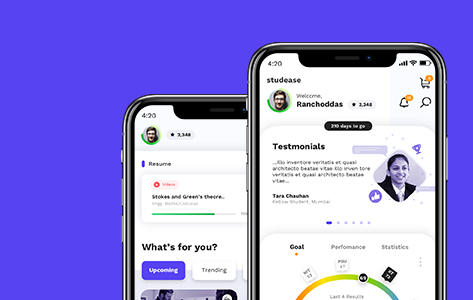The COVID-19 pandemic has influenced education systems around the world, prompting the sudden and absolute closure of schools, colleges, and universities. Most governments worldwide have briefly shut educational institutions trying to contain the spread of COVID-19. As of June 2020, around 1.75 billion students are influenced because of school shut-downs.
As per UNICEF, 134 nations are currently executing a nation-wide termination and 38 are actualizing local terminations, affecting about 98.5 percent of the world's understudy populace. The pandemic has affected more than 91% of students worldwide, with approximately 1.6 billion children and youngsters unable to attend physical schools due to temporary closures and lockdowns.
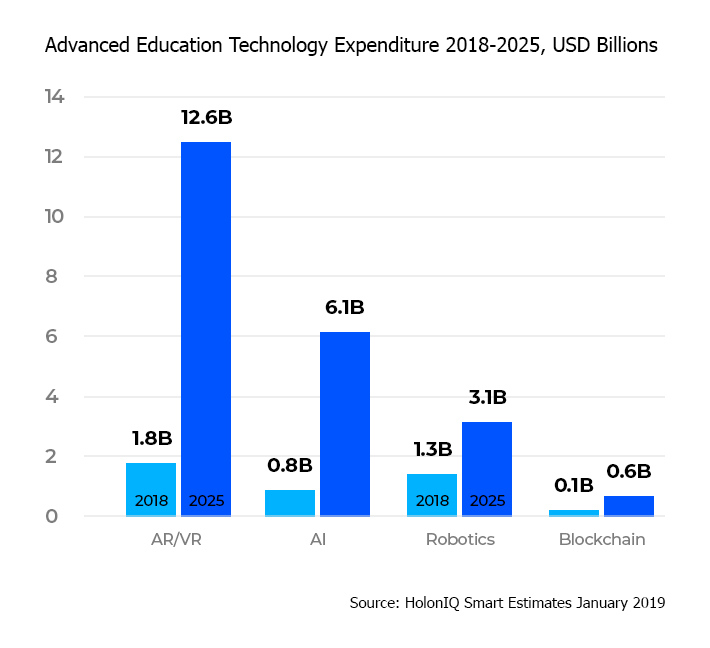
This blog sheds light on the current Edtech effects and how digital transformation has impacted it.
Table of Contents
- Speedy Digitalization in Pandemic Because Education Can’t Wait
- Education on Demand: Customized Learning Experiences
- Adaptive Learning: The Future of EdTech
- What is Adaptive Learning
- Advantages Of Adaptive Learning
- An effective method to Apply Adaptive Learning In Practice
- How technology can help in the personalization of education?: A small survey
- Prepare on Digital Platform, prepare for Digital Platform
- Major Challenges for EdTech Companies
- Possible Solutions and Roadmap
- Conclusion: Decentralization and Democratization of the Education system
Speedy Digitalization in Pandemic Because Education Can’t Wait
UNESCO suggested using distance learning projects and open educational applications and platforms to teach students distantly and limit the interruption of learning. The use of technology for distance learning, remote education, and e-learning or m-learning during the COVID-19 pandemic is rising and advancing rapidly.
At the present outlook of Edtech platform and freemium solutions, a report by Electronics Service Distributor RS states that 50.8% of teachers are aware of what edTech solutions are, while 35.6% have heard about it but aren’t certain about the terminology and another 13.6% is still no knowledge of the EdTech industry.
Education Technology Is Gradually Leveraging the Rate of Awareness and Acceptance:

Online learning has become a critical lifeline for education, as establishments look to limit the potential for community transmission. Technology can empower instructors and students to get to particular materials well past course readings, in numerous organizations and in manners that can connect everyone.
Teaching-learning institutes are rapidly looking forward to adapting the feasible available solution in the market, to avoid impact on academics. Schools, Universities, and Edtech Entrepreneurs are pushing their backs for strengthening the Edtech experience.
Because of the COVID-19 pandemic, utilization and implementation of digital solutions have shot up.
Digital transformation in education is establishing roots not only in New York, San Francisco or the Middle East but also around the world. Top Edtech companies get involved resources tech to build a comprehensive solution.
Numerous schools started directing classes by means of videotelephony programming, for example, Zoom. Zoom experienced a sudden rise of 200 million daily participants, both free and paid from 10 million yearly users.
Organization for Economic Co-activity and Development has made plans to guide educational response to the COVID-19 pandemic for distance learning. All around the globe, schools are leveraging existing platforms such as Google classroom, Microsoft Education, and conferencing applications like Zoom. For students, different video calling platforms are accessible, for example, [1] TEDed, and Minecraft Education.
Brainvire experienced a sudden breakneck speed in Edtech digitalization requirements from Education Leaders and Innovators.
Education on Demand: Customized Learning Experiences
Before COVID-19 disturbed our lives and constrained our children to open their books and study from home, the flow was simpler. From kindergarten to high school, classrooms are controlled by educators who convey exercises that start and end with a chime. They set tests, watch over assessments, and post grades that may charm, frustrate, or even amazement guardians.
One-size-fits-all approach to deal with education has been the same for many years. Nonetheless, it is experiencing remarkable change due to the COVID-19 pandemic.
The response to the Coronavirus to Learning has shown how technology can help change the way we teach and learn. For quite a long time, policymakers have been investigating new and transformative ways to deal with teaching that can go beyond online exercises at home.
In Pandemic, Digitization came as Remedy to Multiple Issues, same for eLearning Solutions for No Impact on Education. Online Learning Solutions in this phase strategies on “Managing Continuity” and “Improving and Constant Accelerating” – as diagnosed by Word Bank
Currently, we have systems that can possibly change and improve the framework so that students can accomplish more and gain many abilities with better results. Introducing online solutions is a fundamental move wherein education will move from ‘a teaching culture to a learning culture’.
Students will be encouraged to learn for themselves in flexible and collaborative ways, both inside and outside classrooms at their own pace. They will have the option to follow their own strengths and weaknesses. Parents will be better connected and engaged with their kid's learning with assurance, detail, and certainty.
Prominent EdTech companies have involved resources tech hubs to create interactive solutions in New York, San Francisco, the Middle East and other parts of the world.
Maybe technology's most immediate effect will be the rise of "customized realizing" where every student appreciates the concentrated effort from teachers who will have access to real-time information on their students.
Customized learning is a comprehensive methodology that must accomplish more than just focus on scholarly advancement.
Online Learning tactics will assist instructors to manage factors that influence social and emotional health. Educators will have the option to guarantee students feel motivated, protected, valued, and ready to learn in ways that were previously unimaginable. New learning approaches will be able to adjust to the necessities of individual students without guidelines or intervention from their teachers.
Real-time data, developments like artificial intelligence (AI), and scores, will help change the roles and relationships of students, instructors, and parents. Teachers will have access to real-time data about students and how well each one of their students is progressing, both scholastically and emotionally. With this information, they can devise new tests and offer proper help to every child to move forward.
The smarter the technology gets, the more the teacher is empowered and supported. Customized learning and real-time information could also lead to an end to the current pattern of exercises and tests. So they will be reviewed on their current status and ongoing assessments that extend the scope of understanding to a deeper range of intelligence and capabilities.
EdTech companies across the globe are taking leaps and bounds to transform the traditional educational system. The Middle East, New York, and San Francisco are some popular geographic locations in search for reliable EdTech companies.
Brainvire happens to have tapped Saudi Arabia as one of the best EdTech companies with a revolutionary learning platform. This state-of-an-art Edtech solution unifies students, parents, and teachers with a progressive learning experience. The use of different type of educational technology for real-time tracking, customized dashboards, and interactive live classroom sessions accelerated students’ academic performance.
Adaptive Learning: The Future of EdTech
What is Adaptive Learning?
Adaptive learning is a computer-based or online education framework that adjusts the introduction of material according to student performance. Best-of-breed frameworks catch fine-grained information and use learning data to empower human tailoring of responses. The related learning management systems (LMS) provide extensive administration, documentation, tracking, reporting, and user management.
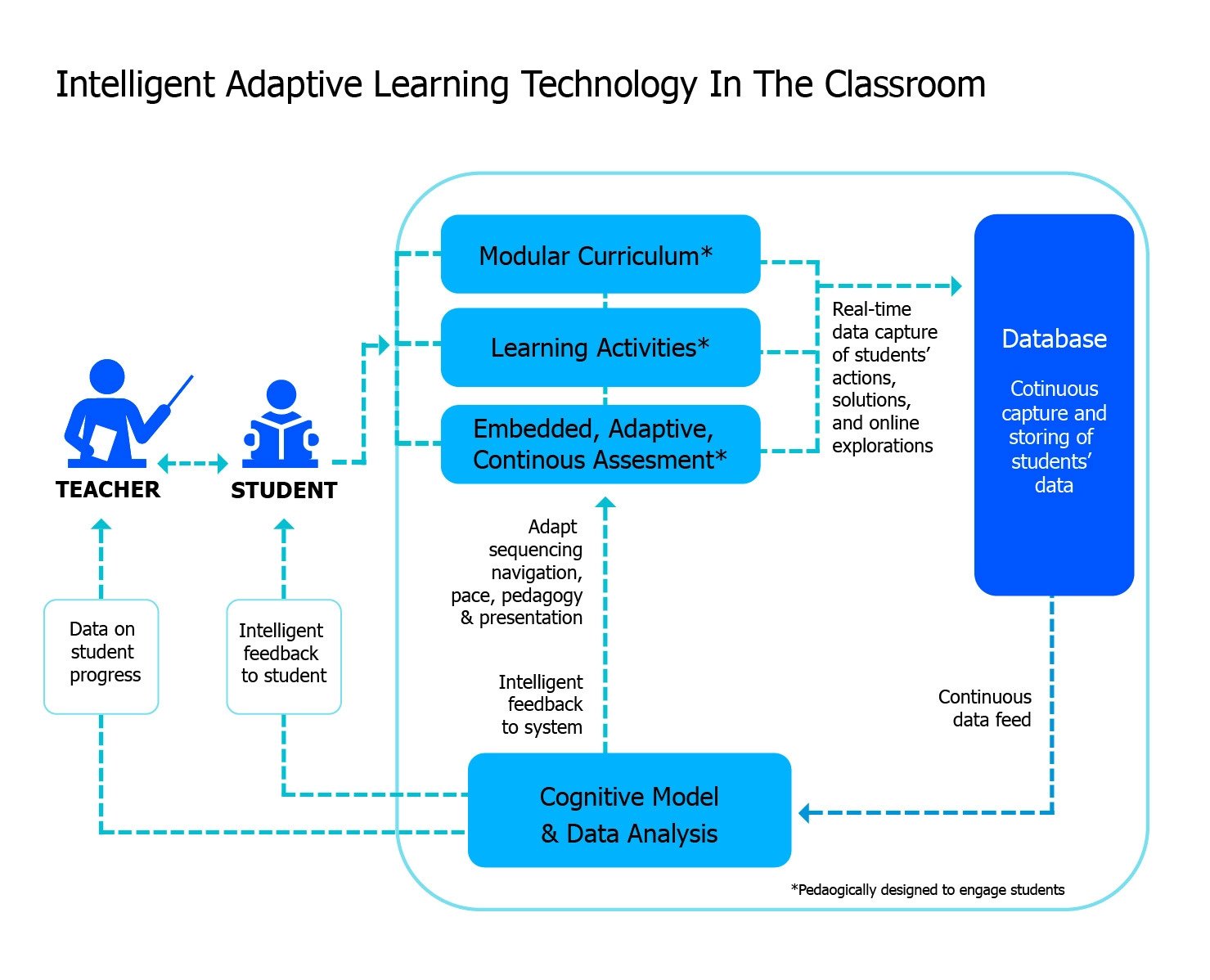
For schools and universities to execute this style of learning over the typical pedagogical educational plan, it would require a change in outlook that would be a paradigm shift. Although adaptive learning is away from traditional pedagogical methods, teachers expect this will slowly become a new standard, in time, with courses adjusted around the unique needs of every student.
Advantages Of Adaptive Learning
Each understudy learns in different manners, even when these are arranged into general categories (for example visual, spatial, logical, social), students will have distinctive learning results.
- Consolidating Adaptive Learning with Predictive Analysis holds extraordinary potential for improving the manner in which students learn and delivering positive learning results.
- AI-based Intelligence systems can gather and process gigantic amounts of information from the students' learning exercises, for example, the amount of time spent on finishing each task, reaction latency, and appraisal results.
- Insights and Analytics can be utilized to detect patterns and fabricate predictive models that help recognize exclusive student needs and modify the material passed to each student.
- Algorithms investigate information a lot quicker than people. Along these lines, students get the material, prompts, and instructions—all of which change progressively dependent on their individual needs and capacities.
Numerous instructors can see the advantages of adaptive learning, the test is figuring out how to actualize it and to do so in a cost-effective way.
An effective method to Apply Adaptive Learning In Practice
Fortunately, we are currently at a point where education software is advanced enough that it tends to be increasingly custom-made or developed around the necessities of students, teachers, and content creators.
Rather than offering a single bundle of learning for one course, learning content creators and providers can tailor learning bundles around an assortment of needs. A brisk appraisal, that any teacher or mentor can execute, should be able to decide the learning styles present in a specific course pathway and class.
With that data available, educators can utilize education management software to actualize a progression of choices for the different learning styles in each class. Students could be given a list of choices, from conventional teacher-led instruction through communications like recordings, tests, exercises, learning meetings and software programs on a tablet, telephone or PC.
Despite concerns regarding costs, with the right resources in place, making a series of learning pathways doesn't cost more than getting ready-made traditional materials and types of learning. Educators don't have to stress over adaptive learning assuming control over core components of a course either. Rather, the adaptive components can be elective or core learning can be taught first, trailed by a time of an exercise where various students approach concentrating in a variety of ways that rely upon what they need and how they learn.
How technology can help in the personalization of education?: A small survey
Brainvire has conducted a small survey with among EdTech C-Level professionals and stumbled upon some key findings which could be very crucial for EdTech decision-makers, CTOs, and CEOs for their digital transformation. This can also be valuable for EdTech start-ups.
Prepare on digital platform, prepare for digital platform
Digitalized change has been undulating through almost every industry for many years now and brands around the world are discovering approaches to execute new technologies into their client and customer relationship activities.
Essentially, it comes down to an ever-expanding requirement for the right digital skills. It's additionally important to accept that everybody may not have the correct degree of digital skills. It's also very simple to let misguided judgments or even ignorance make you believe that your organization's employees have all the skills they need to fit in properly with the digital age. Ongoing studies show that less than 25% of organizations believe they are in the right place in terms of the digital skills they need. Furthermore, within the decade, almost 90% of jobs will require digital competency.
The world is seeing the rise of the education technology(edtech) sector that can help employers connect the digital divide with online courses across data sciences, cloud solutions, advanced reporting, and more. These edtech companies are utilizing computerized reasoning and AI to provide customized learning programs that adjust to students' current abilities and learning objectives. Online training platforms are ready to use best practices from leading institutions over the world, to deliver non-traditional abilities like critical thinking and complex decision-making.
Undertaking digital reskilling of the workforce regularly includes adjusting time and opportunity cost. Business visionaries can begin by utilizing a blend of redistributing, flexi-employing, and longer-term training to help guarantee that advanced business needs can be met.
Moreover, there should be more endeavors towards expanding and fortifying public-private organizations in this space, as a persistent digital skills gap is a genuine danger to the sustained growth of organizations and the economy. The government's emphasis on upgrading higher education to bring about a better focus on advanced skills is a positive development; introducing digital skills in early learning is essential to help prepare our children for the future.
Major challenges for EdTech companies
The EdTech business is confronted with many challenges. Many Edtech businesses and startups guarantee that they understand the Edtech industry. However, there is no conceivable method to completely identify all school difficulties or appreciate the different needs of students and educators.
According to Statista, almost 24% of online students have concerns about the quality of learning on e-learning platforms. You can refer to the graph below.
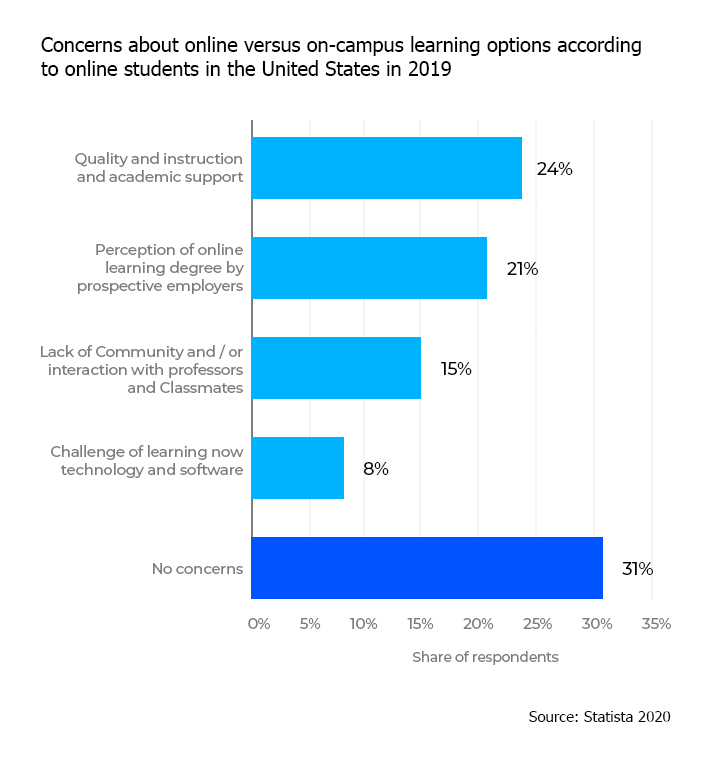
Some of the challenges faced by Edtech companies are-
1. Lack of right technological infrastructure
In developing countries, many students do not have high bandwidth or strong internet connection that online courses require and are therefore unable to catch up with their virtual classmates. A malfunctioning monitor makes it impossible to follow the Course Management Program, and a learning experience becomes difficult. However, most of them live off campus and find it difficult to keep up with the technical specifications of the chosen course. Some of them do not even own computers and are seeking technical assistance from the Learning Resource Centers.
2. Virtual classrooms and virtual assessments
The customers of Edtech are classroom educators and students. Direct executives and Boards of Education don't encounter any Edtech directly. But they are the people liable for building up financial plans and approving expenditure.
3. Student’s lack of involvement due to an array of distractions
With online education, parents don’t like the students’ lack of involvement and array of options and distractions. Parents and teachers usually feel pupils are prone to lose their concentration while studying at home since there are multiple other distractions present. They fear the student’s lack of sincerity and focus.
4. Not willing to pay for online education.
A lot of parents and students are not willing to pay for online classes. The major reason behind this is that parents try to equate the importance of classroom teaching with online education and don’t find the latter worth it. For parents, staying at home, and learning through the computer doesn’t fit well with their educational ideology.
5. Lack of personalization on the EdTech platform
Parents fear a lack of individual attention and personalization in online classes. Many times online classes are simply administered without taking into student's individual strengths and weaknesses.
Possible solutions and the roadmap
Students cannot afford to take hours to download the reading materials before the exam day. They should have the proper cloud storage or materials available on the website itself. The only solution to this dilemma is understanding the kind of technical support required for a certain course before enrolling in it, as well as to better prepare themselves for the successful completion of the course.
Edunguru is a prominent face in the e-learning industry and has revolutionized the delivery of education to the masses. Brainvire developed a personalized portal that would cater to the dynamic needs of the education industry and comply with K-12 education standards. We used our expertise in Artificial Intelligence and mobile application development to develop a digital education platform. Features like online videos, copyright security, fast streaming on a low bandwidth connection, intelligent spoken English solution, and event management are a part of this venture. A scalable Learning Management System (LMS) will provide a detailed overview of all the courses to the admin and also help the students to track their own progress.
We Introduced innovative technologies and ideas to make Edtech experience as close as reality. E-Learning training providers should focus on practical skills rather than solely focusing on developing theoretical. Implementing hands-on learning projects in combination with 1:1 mentoring is one of the most successful ways to improve practical skills for online students.
Keypath offers online learning courses from top universities worldwide. The e-learning platform has successfully enrolled students from more than 45 countries for its top-rated e-learning courses. The platform optimizes instructor-led courses, creates content, and manages class attendance in online environments. It manages registration, online content, hours, courses, students, tutors, and communication, and showcases student’s bio & achievements in one place. The well-designed interface presents easy navigation to monitor server performance in a simple way.
Real-time feedback options from the instructors are critical. Ensure constant communication through Enhanced Messaging Interfaces. Enable Contact Us forms for each and every course, for offline support. Teachers and administrators can return to the students at the earliest opportunity and attend to their concerns.
Keep a free version of the majority of programs just to get people in. Free trials and free introductory courses often work to lure consumers to pay for the full version of a product. The same concept can be applied to online courses as well. Online course providers can have free versions of lessons providing the basic idea and introduction about the course. This will encourage students to pay for the full version if they find that course interesting for learning.
Established in 1988, Sterlite is a well-known name in converged fiber and wireless networks. Their expertise ranges from optical fiber and cables to hyper-scale network design. With 271 patents and counting, it partners with global telecom companies and citizen networks to design, deploy, and manage multiple cloud-native software networks. To push its exponential growth curve further, the client wanted Brainvire to develop a high-end eLearning solution, which can be used to enhance the skills of the tech community. Brainvire’s consultants ideated and developed an in-house training academy that can host live webinars and podcasts related to diverse technical skills. The platform helps individuals to work on other key areas, such as communication, lateral thinking, teamwork, and conflict resolution.
Keep a free online automated assessment system so that it neither cost the company nor the students. Both students and teachers can benefit from this since the former will receive feedback and grades while the latter will be able to correct student assignments without paying for any assessment tool themselves.
Understanding the timing, preferences, and background of the user by asking proper questions on the platform and delivering highly personalized recommendations. This can be done by conducting a quick survey of the student’s interests, weaknesses, and strengths before beginning the course. Based on the acquired information, teachers can plan and develop assignments and lessons according to students’ individual needs.
Differentiated instructions and evaluation systems. Teaching methods should be varied in nature. They can include different styles like theory, practicals, problem-solving techniques, storytelling, and case studies. Evaluation systems and grading patterns should also be changed from time to time with a mix of marks, grades, credits, MCQs, spot tests, and quizzes.
Eduaura is the biggest and most popular online learning hub across Asia. They offer learning solutions for 6-12 grades, competitive exams, and several other courses. They provide concept-based learning, cross-board syllabus, live classes, and unlimited practice to all their students. Eduaura is looking for a quick reach out amongst the users through the website and mobile app.
Brainvire’s specialists integrated the client’s system with an OTT platform called ZEE5. Students can subscribe to this platform to get the required education content. This integration helped the client with improved data management and our team made provisions to track and check concepts that the students studied so far. For a compatible solution and crunch in time, Brainvire proposed for Progressive Web Application Development, for seamless reach to website and app users.
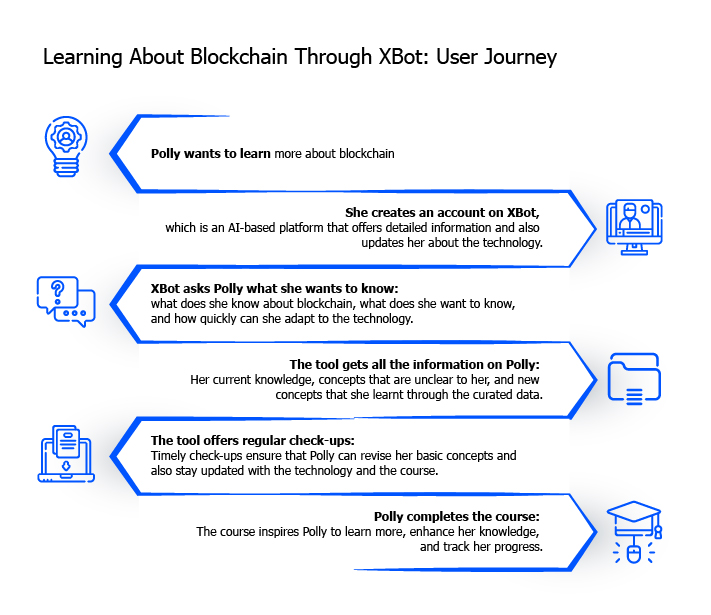
Brainvire launched InKnowledge to simplify university management. Packing a variety of individual applications such as Mentor-Track, eLearning Compliance (ELC), Faculty Profiles, Grant Management, and Conflict of Interest, this is a robust cloud-enabled business parcel. The ELC module of this system has a database of all state entities and licensure agencies for approving different courses. Successfully applied in more than 25 US institutions, the administrative process is streamlined with InKnowledge.
Conclusion: Decentralization and Democratization of the Education system
Decentralization is characterized as a transfer of decision-making authority closer to the customer or to the beneficiary.
In the past few decades, the decentralization of school administration has prevailed in most of the world's education systems. When properly applied, decentralization has the ability to enhance the quality of education and learning outcomes. Good system design is needed to reduce the potential adverse effects of decentralization, such as regional disparities, overlap/conflict policies, and elite capture.
Research indicates that the decentralization of administrative functions to school-based management can lead to better empowerment and cooperation among teachers, a greater school-wide emphasis on professional development, and a greater sense of accountability.
Educational democratization is focused on the interaction of four main interrelated components: the democratization of modes of educational activity, the democratization of the quality of education, the humanization of the functioning of educational institutions, and extra-curricular student activities, and the democratization of engaging education with other domains of social life.
Summing up, it suffices to say that Edtech is soon going to be the new approach towards learning and teaching. Bidding goodbye to pedagogical styles of learning, Edtech is set to usher in a more personalized concept.
References
-
https://edwiser.org/blog/biggest-elearning-challenges-students/
-
https://www.educationcannotwait.org/covid-19/
-
https://www.thehindu.com/sci-tech/technology/why-elearning-is-not-a-sustainable-solution-to-the-covid19-education-crisis-in-india/article31560007.ece
-
https://www.dreambox.com/adaptive-learning
-
https://elearningindustry.com/adaptive-learning-for-schools-college
-
https://www.financialexpress.com/industry/msme-skill-digital-skilling-how-trinity-of-govt-edtech-startups-tech-businesses-is-helping-msmes-grow-online/1889798/
-
https://etaileurope.wbresearch.com/blog/digital-skills-gap
-
https://adamfard.com/blog/5-edtech-challenges
-
https://digitalmarketinginstitute.com/blog/why-your-organization-needs-digital-skills-training
-
https://theconversation.com/education-post-covid-19-customised-blended-learning-is-urgently-needed-138647
-
https://news.microsoft.com/apac/features/technology-in-schools-from-a-teaching-culture-to-a-learning-culture/
-
https://www.getmagicbox.com/blog/how-to-ease-independent-learning-experience-during-covid19/
-
https://government.economictimes.indiatimes.com/news/education/covid-19-crisis-and-digital-learning-need-to-revamp-education-system/75402297
Related Articles
Digital Transformation
Navigating the Future of Digital Commerce: Trends, Technologies, and Adobe’s Role
Digital Transformation
Headless Commerce Accelerated: Building Future-Ready Storefronts with Adobe Commerce & Modern Frameworks
Digital Transformation
Predictive Analytics for E-commerce Apps: How AI Anticipates Customer Needs & Boosts Sales

